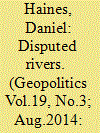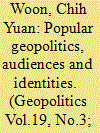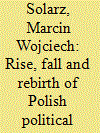|
|
|
Sort Order |
|
|
|
Items / Page
|
|
|
|
|
|
|
| Srl | Item |
| 1 |
ID:
134626


|
|
|
|
|
| Summary/Abstract |
This paper compares how officials in Rousse, Bulgaria, and Transcarpathia, Ukraine, interact with ‘foreigners’: officials from agencies of the European Union (EU), other member states, and foreign consultants. The goals are: a) to compare the extent to which officials in the two communities participate in transnational networks of European bureaucracies, the so-called ‘transnational fusion bureaucracy’; b) to assess the ways in which the bottom-up actions of those officials relate to the broad, top-down policy goals of the EU; and c) to analyse the effects of those interactions on the business environments of the two communities. As a result of comparing the two regions, this paper argues that similar processes of integration in the transnational fusion bureaucracy occur in the internal periphery of the European Union (Rousse) and in areas outside the EU borders (Transcarpathia). In doing so, it questions the extent to which both regions participate in an emerging ‘transnational fusion bureaucracy’ emphasising difference in intensity of the considered processes, as well as the different responses by the two bureaucracies to inputs and opportunities provided by the EU.
|
|
|
|
|
|
|
|
|
|
|
|
|
|
|
|
| 2 |
ID:
134631


|
|
|
|
|
| Summary/Abstract |
The construction of territorial sovereignty is key to conceptions of modern states. Yet after the Partition of India and Pakistan in 1947, when both became independent from Britain, the precise nature of India’s relationship to Pakistan was open to some question. Was Pakistan a foreign country? Was India’s relationship to it international? This article uses the example of a dispute over water resources in the Indus Basin to highlight the process through which Indian officials in New Delhi’s External Affairs and Law ministries came to define Pakistan as constitutionally, as well as geographically, “outside” India between 1948 and 1951. Yet while Indian policy makers manoeuvred into an aggressive stance against Pakistan, both countries’ membership of the British Commonwealth implied an international relationship blurring the formal distinction between “domestic” and “foreign”. Negotiating the contradictions between Commonwealth rules and the desire to assert sovereignty over territory and resources, I argue, made Indian sovereignty contingent on circumstance.
|
|
|
|
|
|
|
|
|
|
|
|
|
|
|
|
| 3 |
ID:
134621


|
|
|
|
|
| Summary/Abstract |
This article is concerned with the existence of states as a matter of fact, and it approaches that subject within the context of the ontology of social reality as a whole. It argues, first, that states do not have a place in the traditional Platonist duality of the concrete and the abstract. Second, that states belong to a third category – the quasi-abstract – that has received philosophical attention with a recently emerging theory of documentality. Documentality, derived from Austin’s theory of performative utterances, claims that documents acts can bring quasi-abstract objects, such as states into being. Third and finally, it argues that the existence of quasi-abstract states should not be rejected on the basis of the Principle of Parsimony, because geopolitical theories that recognise the existence of quasi-abstract states will have greater explanatory power than theories that deny their existence.
|
|
|
|
|
|
|
|
|
|
|
|
|
|
|
|
| 4 |
ID:
134627


|
|
|
|
|
| Summary/Abstract |
The European Union is often conceptualised as an entity that is profoundly different from that of the modern state. Through a reading of the recent humanitarian crisis precipitated by large-scale migration into Greece, the paper challenges the understanding that the crafting of the European Union (‘Euro-crafting’) is qualitatively different from the crafting of the modern state. Conceptually, the paper proposes that Euro-crafting should be thought through in relation to practices of statecraft, instead of a priori postulated as qualitatively different from such practices. Putting such an understanding of Euro-crafting to work, the paper explores the recent humanitarian crisis precipitated by large-scale migration into Greece and demonstrates how practices of Euro-crafting mirror the major desire-driven practices of modern statecraft; practices of ordering, bordering, and identification.
|
|
|
|
|
|
|
|
|
|
|
|
|
|
|
|
| 5 |
ID:
134625


|
|
|
|
|
| Summary/Abstract |
This article will focus on an ongoing process of Jerusalem’s contested urban space during the last decade namely the immigration of Palestinians, mostly Israeli citizens, to “satellite neighbourhoods”, i.e. Jerusalem’s colonial neighbourhoods that were constructed after 1967. Theoretically, this paper attempts to discuss neighbourhood planning in contested cities within the framework of geopolitics. In more details, we will focus on the relevance of geopolitics to the study of neighbourhood planning, by which we mean not merely a discussion of international relations and conflict or of the roles of military acts and wars in producing space. Rather, geopolitics refers to the emergence of discourses and forces connected with the technologies of control, patterns of internal migrations by individuals and communities, and the flow of cultures and capital.
|
|
|
|
|
|
|
|
|
|
|
|
|
|
|
|
| 6 |
ID:
134629


|
|
|
|
|
| Summary/Abstract |
Cross-border integration is a multifaceted as well as contextually contingent process. While various conceptualisations have been developed, the theoretical foundations of the concept appear insufficient in order to grasp the very significance of such a process of cross-border regionalism. In order to help make sense of the diversity of configurations observed, this article seeks to deconstruct the concept according to the role played by the border as a resource and to develop a theoretical framework based on two contrasted models of cross-border integration. The underlying hypothesis is that cross-border integration does not derive from the mere opening of national borders that it supposedly helps at the same time to remove, but stems from the strategic behaviour of actors who actively mobilise borders as resources. The first model, called ‘geo-economic’, is mainly based on the mobilisation of the border as a differential benefit and aims to generate value out of asymmetric cross-border interactions. In doing so, this process of functional integration is likely to increase cross-border socio-economic disparities and leads to cooperation oriented towards instrumental purposes such as increasing the economic utility of the border or regulating negative externalities. The second model, called ‘territorial project’, emphasises the border resources that involve a convergence of both sides of a border, either through a process of hybridisation/innovation or via the territorial and symbolic recognition borders entail. In this process of place-making that transcends the border, mutual understanding and trust between the actors is seen to be key and the willingness to cooperate essential. Conceived as ideal-types, the two models of cross-border integration are contrasted and to some extent contradictory. They are however not mutually exclusive and different kinds of combinations are examined based on concrete examples.
|
|
|
|
|
|
|
|
|
|
|
|
|
|
|
|
| 7 |
ID:
134633


|
|
|
|
|
| Summary/Abstract |
Audience research has traditionally been neglected within the subfield of popular geopolitics. However in recent years, geographers are increasingly focusing on the making of geopolitical meanings by audiences as they consume popular culture and related texts. Drawing on recent assemblage thinking in geopolitics, this paper argues that audiences form part of the animators of a network that links the human body with places, environments, objects and discourses related to geopolitics. By investigating Filipinos’ critical readings of and engagements with the ‘war on terror’ in Mindanao as represented through the national newspaper, the Philippines Daily Inquirer, the agency and power of audiences in the creative enactments of geopolitics and geography are illuminated. As such, understanding the complex interactions between popular media and its audiences can prove useful in casting insights into the everyday, geopolitical ‘playing out’ of issues of terrorism, violence and peace in the Philippines context and beyond.
|
|
|
|
|
|
|
|
|
|
|
|
|
|
|
|
| 8 |
ID:
134630


|
|
|
|
|
| Summary/Abstract |
This article situates India’s Maoist insurgency within longer term processes of state expansion in the east and centre of the country. Drawing on Henri Lefebvre’s work on space, its core claim is that since the onset of colonialism the region has been produced as a peripheral area whose primary function has been as a zone of settlement and a source of natural resources. Consequently the state has been simultaneously thin and repressive, leading to the creation of an oppositional insurgent space in which the Maoist guerrillas are only the most recent and visible actors. Currently new patterns of hyper-state and hybrid state/insurgent spaces are emerging: the former structured around the forced relocation of entire populations into tightly controlled and regulated camps and the latter around an emergent system of dual authority in which the demarcation between official and insurgent governance is blurred.
|
|
|
|
|
|
|
|
|
|
|
|
|
|
|
|
| 9 |
ID:
134635


|
|
|
|
|
| Summary/Abstract |
The article presents an outline of the history of Polish political geography. Its development as a science in fact began in the nineteenth century and its golden age lasted all the way through to the fall of the Polish state in 1939. The loss of independence in the period 1939/1945–1989 also brought with it the fall of political geography in Poland. After 1989, along with the restoration of freedom of research in Poland, a new period started in the history of Polish political geography
|
|
|
|
|
|
|
|
|
|
|
|
|
|
|
|
| 10 |
ID:
134624


|
|
|
|
|
| Summary/Abstract |
Against the backdrop of the international political and economic system’s increasing fragmentation, this article attempts to analyse the geopolitical ambitions of the EU. Currently, the EU strives to become an independent global power. For this purpose, the EU tries to establish greater independence from the US and, to a certain degree, from its Member states. This is closely linked to (a) the emergence of the Euro as a currency competing with the US dollar for the status of the ‘global reserve currency’ and (b) the construction of a common foreign and ‘security’ policy. Taking the German literature on the political economy of the state and on the European Integration, insights from neo-Gramscian International Political Economy, and the ‘scale debate’ in Anglophone geography as point of departure, I analyse the European ensemble of state apparatuses and demonstrate that these ambitions have failed, due to the status quo of a fragmented Europe.
|
|
|
|
|
|
|
|
|
|
|
|
|
|
|
|
| 11 |
ID:
134634


|
|
|
|
|
| Summary/Abstract |
This article studies the geopolitical traditions of spatial imagining of Serbia amongst the country’s political elites since the break-up of Yugoslavia in the early 1990s. It examines some of the socially dominant discourses of spatial positioning of Serbia as a historical-political narrative. The study argues that one can identify five distinct geopolitical traditions that, in variably overlapping or mutually contradicting ways, address two questions: ‘Where is Serbia’ and ‘How is its perceived smallness felt and described’? A first tradition is that which attributes sacred, divine and martyr-like features to the country, its small earthly “Serbian lands” and people. A second tradition conveys spatially maximised and biopolitical visions of “Serbdom”, amounting to variable designs of a “Greater Serbia” anxious about its felt frontiers and smallness. The final three traditions are the mutually exclusive positioning of Serbia around an East-West axis as either Eastern or Western, or a geographically unique and exceptional bridge between the two, whereby each positioning recasts smallness as a crucial feature of geopolitical exceptionality. The article concludes with some general observations on the challenges of studying geopolitical cultures.
|
|
|
|
|
|
|
|
|
|
|
|
|
|
|
|
|
|
|
|
|